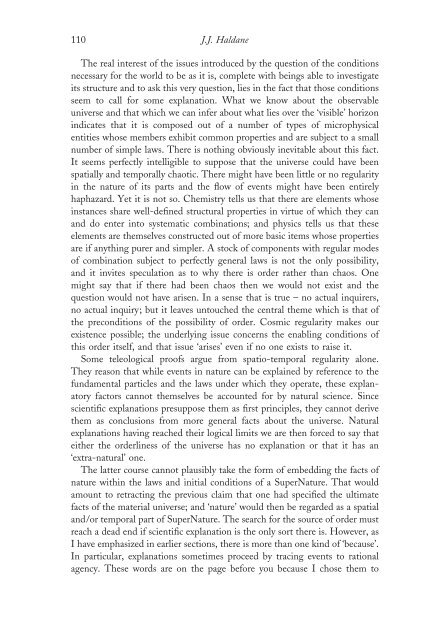Atheism and Theism JJ Haldane - Common Sense Atheism
Atheism and Theism JJ Haldane - Common Sense Atheism
Atheism and Theism JJ Haldane - Common Sense Atheism
Create successful ePaper yourself
Turn your PDF publications into a flip-book with our unique Google optimized e-Paper software.
110 J.J. <strong>Haldane</strong><br />
The real interest of the issues introduced by the question of the conditions<br />
necessary for the world to be as it is, complete with beings able to investigate<br />
its structure <strong>and</strong> to ask this very question, lies in the fact that those conditions<br />
seem to call for some explanation. What we know about the observable<br />
universe <strong>and</strong> that which we can infer about what lies over the ‘visible’ horizon<br />
indicates that it is composed out of a number of types of microphysical<br />
entities whose members exhibit common properties <strong>and</strong> are subject to a small<br />
number of simple laws. There is nothing obviously inevitable about this fact.<br />
It seems perfectly intelligible to suppose that the universe could have been<br />
spatially <strong>and</strong> temporally chaotic. There might have been little or no regularity<br />
in the nature of its parts <strong>and</strong> the flow of events might have been entirely<br />
haphazard. Yet it is not so. Chemistry tells us that there are elements whose<br />
instances share well-defined structural properties in virtue of which they can<br />
<strong>and</strong> do enter into systematic combinations; <strong>and</strong> physics tells us that these<br />
elements are themselves constructed out of more basic items whose properties<br />
are if anything purer <strong>and</strong> simpler. A stock of components with regular modes<br />
of combination subject to perfectly general laws is not the only possibility,<br />
<strong>and</strong> it invites speculation as to why there is order rather than chaos. One<br />
might say that if there had been chaos then we would not exist <strong>and</strong> the<br />
question would not have arisen. In a sense that is true – no actual inquirers,<br />
no actual inquiry; but it leaves untouched the central theme which is that of<br />
the preconditions of the possibility of order. Cosmic regularity makes our<br />
existence possible; the underlying issue concerns the enabling conditions of<br />
this order itself, <strong>and</strong> that issue ‘arises’ even if no one exists to raise it.<br />
Some teleological proofs argue from spatio-temporal regularity alone.<br />
They reason that while events in nature can be explained by reference to the<br />
fundamental particles <strong>and</strong> the laws under which they operate, these explanatory<br />
factors cannot themselves be accounted for by natural science. Since<br />
scientific explanations presuppose them as first principles, they cannot derive<br />
them as conclusions from more general facts about the universe. Natural<br />
explanations having reached their logical limits we are then forced to say that<br />
either the orderliness of the universe has no explanation or that it has an<br />
‘extra-natural’ one.<br />
The latter course cannot plausibly take the form of embedding the facts of<br />
nature within the laws <strong>and</strong> initial conditions of a SuperNature. That would<br />
amount to retracting the previous claim that one had specified the ultimate<br />
facts of the material universe; <strong>and</strong> ‘nature’ would then be regarded as a spatial<br />
<strong>and</strong>/or temporal part of SuperNature. The search for the source of order must<br />
reach a dead end if scientific explanation is the only sort there is. However, as<br />
I have emphasized in earlier sections, there is more than one kind of ‘because’.<br />
In particular, explanations sometimes proceed by tracing events to rational<br />
agency. These words are on the page before you because I chose them to

















